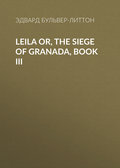
Эдвард Бульвер-Литтон
The Disowned — Complete
It is about six months since he has returned to England, and he has very lately obtained a seat in Parliament: so that we may trust soon to see his talents displayed upon a more public and enlarged theatre than they hitherto have been; and though I fear his politics will be opposed to ours, I anticipate his public debut with that interest which genius, even when adverse to one’s self, always inspires. Yet I confess that I am desirous to see and converse with him once more in the familiarity and kindness of private intercourse. The rage of party, the narrowness of sectarian zeal, soon exclude from our friendship all those who differ from our opinions; and it is like sailors holding commune for the last time with each other, before their several vessels are divided by the perilous and uncertain sea, to confer in peace and retirement for a little while with those who are about to be launched with us on that same unquiet ocean where any momentary caprice of the winds may disjoin us forever, and where our very union is only a sympathy in toil and a fellowship in danger.
Adieu, my dear duke! it is fortunate for me that our public opinions are so closely allied, and that I may so reasonably calculate in private upon the happiness and honour of subscribing myself your affectionate friend, C. L.
Such was the letter to which we shall leave the explanation of much that has taken place within the last three years of our tale, and which, in its tone, will serve to show the kindness and generosity of heart and feeling that mingled (rather increased than abated by the time which brought wisdom) with the hardy activity and resolute ambition that characterized the mind of our “Disowned.” We now consign him to such repose as the best bedroom in the Golden Fleece can afford, and conclude the chapter.
CHAPTER LX
Though the wilds of enchantment all vernal and bright,
In the days of delusion by fancy combined
With the vanishing phantoms of love and delight,
Abandon my soul, like a dream of the night,
And leave but a desert behind,
Be hush'd my dark spirit, for Wisdom condemns
When the faint and the feeble deplore;
Be strong as the rock of the ocean that stems
A thousand wild waves on the shore.
—CAMPBELL.
“Shall I order the carriage round, sir?” said Harrison; “it is past one.”
“Yes; yet stay: the day is fine; I will ride; let the carriage come on in the evening; see that my horse is saddled; you looked to his mash last night?”
“I did, sir. He seems wonderfully fresh: would you please to have me stay here with the carriage, sir, till the groom comes on with the other horse?”
“Ay, do: I don’t know yet how far strange servants may be welcome where I am going.”
“Now, that’s lucky!” said Harrison to himself, as he shut the door: “I shall have a good five hours’ opportunity of making my court here. Miss Elizabeth is really a very pretty girl, and might not be a bad match. I don’t see any brothers; who knows but she may succeed to the inn—hem! A servant may be ambitious as well as his master, I suppose.”
So meditating, Harrison sauntered to the stables; saw (for he was an admirable servant, and could, at a pinch, dress a horse as well as its master) that Clarence’s beautiful steed received the utmost nicety of grooming which the ostler could bestow; led it himself to the door; held the stirrup for his master, with the mingled humility and grace of his profession, and then strutted away—“pride on his brow and glory in his eye”—to be the cynosure and oracle of the taproom.
Meanwhile Linden rode slowly onwards. As he passed that turn of the town by which he had for the first time entered it, the recollection of the eccentric and would-be gypsy flashed upon him. “I wonder,” thought he, “where that singular man is now, whether he still preserves his itinerant and woodland tastes,—
‘Si flumina sylvasque inglorius amet,’
[“If, unknown to fame, he love the streams and the woods.”]
or whether, as his family increased in age or number, he has turned from his wanderings, and at length found out ‘the peaceful hermitage?’ How glowingly the whole scene of that night comes across me,—the wild tents, their wilder habitants, the mingled bluntness, poetry, honest good-nature, and spirit of enterprise which constituted the chief’s nature; the jovial meal and mirth round the wood fire, and beneath the quiet stars, and the eagerness and zest with which I then mingled in the merriment. Alas! how ill the fastidiousness and refinement of after days repay us for the elastic, buoyant, ready zeal with which our first youth enters into whatever is joyous, without pausing to ask if its cause and nature be congenial to our habits or kindred to our tastes. After all, there really was something philosophical in the romance of the jovial gypsy, childish as it seemed; and I should like much to know if the philosophy has got the better of the romance, or the romance, growing into habit, become commonplace and lost both its philosophy and its enthusiasm. Well, after I leave Mordaunt, I will try and find out my old friend.”
With this resolution Clarence’s thoughts took a new channel, and he soon entered upon Mordaunt’s domain. As he rode through the park where brake and tree were glowing in the yellow tints which Autumn, like Ambition, gilds ere it withers, he paused for a moment to recall the scene as he last beheld it. It was then spring—spring in its first and flushest glory—when not a blade of grass but sent a perfume to the air, the happy air,—
“Making sweet music while the young leaves danced:”
when every cluster of the brown fern, that now lay dull and motionless around him, and amidst which the melancholy deer stood afar off gazing upon the intruder, was vocal with the blithe melodies of the infant year,—the sharp, yet sweet, voices of birds,—and (heard at intervals) the chirp of the merry grasshopper or the hum of the awakened bee. He sighed, as he now looked around, and recalled the change both of time and season; and with that fondness of heart which causes man to knit his own little life to the varieties of time, the signs of heaven, or the revolutions of Nature, he recognized something kindred in the change of scene to the change of thought and feeling which years had wrought in the beholder.
Awaking from his revery, he hastened his horse’s pace, and was soon within sight of the house. Vavasour, during the few years he had possessed the place, had conducted and carried through improvements and additions to the old mansion, upon a scale equally costly and judicious. The heavy and motley magnificence of the architecture in which the house had been built remained unaltered; but a wing on either side, though exactly corresponding in style to the intermediate building, gave, by the long colonnade which ran across the one and the stately windows which adorned the other, an air not only of grander extent, but more cheerful lightness to the massy and antiquated pile. It was, assuredly, in the point of view by which Clarence now approached it, a structure which possessed few superiors in point of size and effect; and harmonized so well with the nobly extent of the park, the ancient woods, and the venerable avenues, that a very slight effort of imagination might have poured from the massive portals the pageantries of old days, and the gay galliard of chivalric romance with which the scene was in such accordance, and which in a former age it had so often witnessed.
Ah, little could any one who looked upon that gorgeous pile, and the broad lands which, beyond the boundaries of the park, swelled on the hills of the distant landscape, studded at frequent intervals with the spires and villages, which adorned the wide baronies of Mordaunt,—little could he who thus gazed around have imagined that the owner of all he surveyed had passed the glory and verdure of his manhood in the bitterest struggles with gnawing want, rebellious pride, and urgent passion, without friend or aid but his own haughty and supporting virtue, sentenced to bear yet in his wasted and barren heart the sign of the storm he had resisted, and the scathed token of the lightning he had braved. None but Crauford, who had his own reasons for taciturnity, and the itinerant broker, easily bribed into silence, had ever known of the extreme poverty from which Mordaunt had passed to his rightful possessions. It was whispered, indeed, that he had been reduced to narrow and straitened circumstances; but the whisper had been only the breath of rumour, and the imagined poverty far short of the reality: for the pride of Mordaunt (the great, almost the sole, failing in his character) could not endure that all he had borne and baffled should be bared to the vulgar eye; and by a rare anomaly of mind, indifferent as he was to renown, he was morbidly susceptible of shame.
When Clarence rang at the ivy-covered porch, and made inquiry for Mordaunt, he was informed that the latter was in the park, by the river, where most of his hours during the day-time were spent.
“Shall I send to acquaint him that you are come, sir?” said the servant.
“No,” answered Clarence, “I will leave my horse to one of the grooms, and stroll down to the river in search of your master.”
Suiting the action to the word, he dismounted, consigned his steed to the groom, and following the direction indicated to him, bent his way to the “river.”
As he descended the hill, the brook (for it did not deserve, though it received, a higher name) opened enchantingly upon his view. Amidst the fragrant reed and the wild-flower, still sweet though fading, and tufts of tedded grass, all of which, when crushed beneath the foot, sent a mingled tribute to its sparkling waves, the wild stream took its gladsome course, now contracted by gloomy firs, which, bending over the water, cast somewhat of their own sadness upon its surface; now glancing forth from the shade, as it “broke into dimples and laughed in the sun;” now washing the gnarled and spreading roots of some lonely ash, which, hanging over it still and droopingly, seemed—the hermit of the scene—to moralize on its noisy and various wanderings; now winding round the hill and losing itself at last amidst thick copses, where day did never more than wink and glimmer, and where, at night, its waters, brawling through their stony channel, seemed like a spirit’s wail, and harmonized well with the scream of the gray owl wheeling from her dim retreat, or the moaning and rare sound of some solitary deer.
As Clarence’s eye roved admiringly over the scene before him, it dwelt at last upon a small building situated on the wildest part of the opposite bank; it was entirely overgrown with ivy, and the outline only remained to show the Gothic antiquity of the architecture. It was a single square tower, built none knew when or wherefore, and, consequently, the spot of many vagrant guesses and wild legends among the surrounding gossips. On approaching yet nearer, he perceived, alone and seated on a little mound beside the tower, the object of his search.
Mordaunt was gazing with vacant yet earnest eye upon the waters beneath; and so intent was either his mood or look that he was unaware of Clarence’s approach. Tears fast and large were rolling from those haughty eyes, which men who shrank from their indifferent glance little deemed were capable of such weak and feminine emotion. Far, far through the aching void of time were the thoughts of the reft and solitary mourner; they were dwelling, in all the vivid and keen intensity of grief which dies not, upon the day when, about that hour and on that spot, he sat with Isabel’s young cheek upon his bosom, and listened to a voice now only heard in dreams. He recalled the moment when the fatal letter, charged with change and poverty, was given to him, and the pang which had rent his heart as he looked around upon a scene over which spring had just then breathed, and which he was about to leave to a fresh summer and a new lord; and then that deep, fond, half-fearful gaze with which Isabel had met his eye, and the feeling, proud even in its melancholy, with which he had drawn towards his breast all that earth had left to him, and thanked God in his heart of hearts that she was spared.
“And I am once more master,” thought he, “not only of all I then held, but of all which my wealthier forefathers possessed. But she who was the sharer of my sorrows and want,—oh, where is she? Rather, ah, rather a hundredfold that her hand was still clasped in mine, her spirit supporting me through poverty and trial, and her soft voice murmuring the comfort that steals away care, than to be thus heaped with wealth and honour, and alone,—alone, where never more can come love or hope, or the yearnings of affection or the sweet fulness of a heart that seems fathomless in its tenderness, yet overflows! Had my lot, when she left me, been still the steepings of bitterness, the stings of penury, the moody silence of hope, the damp and chill of sunless and aidless years, which rust the very iron of the soul away; had my lot been thus, as it had been, I could have borne her death, I could have looked upon her grave, and wept not,—nay, I could have comforted my own struggles with the memory of her escape; but thus, at the very moment of prosperity, to leave the altered and promising earth, ‘to house with darkness and with death;’ no little gleam of sunshine, no brief recompense for the agonizing past, no momentary respite between tears and the tomb. Oh, Heaven! what—what avail is a wealth which comes too late, when she, who could alone have made wealth bliss, is dust; and the light that should have gilded many and happy days flings only a ghastly glare upon the tomb?”
Starting from these reflections, Mordaunt half-unconsciously rose, and dashing the tears from his eyes, was about to plunge into the neighbouring thicket, when, looking up, he beheld Clarence, now within a few paces of him. He started, and seemed for one moment irresolute whether to meet or shun his advance, but probably deeming it too late for the latter, he banished, by one of those violent efforts with which men of proud and strong minds vanquish emotion, all outward sign of the past agony; and hastening towards his guest, greeted him with a welcome which, though from ordinary hosts it might have seemed cold, appeared to Clarence, who knew his temper, more cordial than he had ventured to anticipate.
CHAPTER LXI
Mr father urged me sair,
But my mither didna speak,
Though she looked into my face,
Till my heart was like to break.
—Auld Robin Gray.
“It is rather singular,” said Lady Westborough to her daughter as they sat alone one afternoon in the music-room at Westborough Park,—“it is rather singular that Lord Ulswater should not have come yet. He said he should certainly be here before three o’clock.”
“You know, Mamma, that he has some military duties to detain him at W——,” answered Lady Flora, bending over a drawing in which she appeared to be earnestly engaged.
“True, my dear, and it was very kind in Lord —— to quarter the troop he commands in his native county; and very fortunate that W——, being his head-quarters, should also be so near us. But I cannot conceive that any duty can be sufficiently strong to detain him from you,” added Lady Westborough, who had been accustomed all her life to a devotion unparalleled in this age. “You seem very indulgent, Flora.”
“Alas! she should rather say very indifferent,” thought Lady Flora: but she did not give her thought utterance; she only looked up at her mother for a moment, and smiled faintly.
Whether there was something in that smile or in the pale cheek of her daughter that touched her we know not, but Lady Westborough was touched: she threw her arms round Lady Flora’s neck, kissed her fondly, and said, “You do not seem well to-day, my love, are you?”
“Oh!—very—very well,” answered Lady Flora, returning her mother’s caress, and hiding her eyes, to which the tears had started.
“My child,” said Lady Westborough, “you know that both myself and your father are very desirous to see you married to Lord Ulswater,—of high and ancient birth, of great wealth, young, unexceptionable in person and character, and warmly attached to you, it would be impossible even for the sanguine heart of a parent to ask for you a more eligible match. But if the thought really does make you wretched,—and yet,—how can it?”
“I have consented,” said Flora, gently; “all I ask is, do not speak to me more of the—the event than you can avoid.”
Lady Westborough pressed her hand, sighed, and replied not.
The door opened, and the marquis, who had within the last year become a cripple, with the great man’s malady, dire podagra, was wheeled in on his easy-chair; close behind him followed Lord Ulswater.
“I have brought you,” said the marquis, who piqued himself on a vein of dry humour,—“I have brought you, young lady, a consolation for my ill humours. Few gouty old fathers make themselves as welcome as I do; eh, Ulswater?”
“Dare I apply to myself Lord Westborough’s compliment?” said the young nobleman, advancing towards Lady Flora; and drawing his seat near her, he entered into that whispered conversation so significant of courtship. But there was little in Lady Flora’s manner by which an experienced eye would have detected the bride elect: no sudden blush, no downcast, yet sidelong look, no trembling of the hand, no indistinct confusion of the voice, struggling with unanalyzed emotions. No: all was calm, cold, listless; her cheek changed not tint nor hue, and her words, clear and collected, seemed to contradict whatever the low murmurs of her betrothed might well be supposed to insinuate. But, even in his behaviour, there was something which, had Lady Westborough been less contented than she was with the externals and surface of manner, would have alarmed her for her daughter. A cloud, sullen and gloomy, sat upon his brow; and his lip alternately quivered with something like scorn, or was compressed with a kind of stifled passion. Even in the exultation that sparkled in his eye, when he alluded to their approaching marriage, there was an expression that almost might have been termed fierce, and certainly was as little like the true orthodox ardour of “gentle swain,” as Lady Flora’s sad and half unconscious coldness resembled the diffident passion of the “blushing maiden.”
“You have considerably passed the time in which we expected you, my lord,” said Lady Westborough, who, as a beauty herself, was a little jealous of the deference due to the beauty of her daughter.
“It is true.,” said Lord Ulswater, glancing towards the opposite glass, and smoothing his right eyebrow with his forefinger, “it is true, but I could not help it. I had a great deal of business to do with my troop: I have put them into a new manoeuvre. Do you know, my lord [turning to the marquis], I think it very likely the soldiers may have some work on the —— of this month?”
“Where, and wherefore?” asked Lord Westborough, whom a sudden twinge forced into the laconic.
“At W——. Some idle fellows hold a meeting there on that day; and if I may judge by bills and advertisements, chalkings on the walls, and, more than all popular rumour, I have no doubt but what riot and sedition are intended: the magistrates are terribly frightened. I hope we shall have some cutting and hewing: I have no patience with the rebellious dogs.”
“For shame! for shame!” cried Lady Westborough, who, though a worldly, was by no means an unfeeling, woman “the poor people are misguided; they mean no harm.”
Lord Ulswater smiled scornfully. “I never dispute upon politics, but at the head of my men,” said he, and turned the conversation.
Shortly afterwards Lady Flora, complaining of indisposition, rose, left the apartment, and retired to her own room. There she sat motionless and white as death for more than an hour. A day or two afterwards Miss Trevanion received the following letter from her:—
Most heartily, most truly do I congratulate you, my dearest Eleanor, upon your approaching marriage. You may reasonably hope for all that happiness can afford; and though you do affect (for I do not think that you feel) a fear lest you should not be able to fix a character, volatile and light, like your lover’s; yet when I recollect his warmth of heart and high sense, and your beauty, gentleness, charms of conversation, and purely disinterested love for one whose great worldly advantages might so easily bias or adulterate affection, I own that I have no dread for your future fate, no feeling that can at all darken the brightness of anticipation. Thank you, dearest, for the delicate kindness with which you allude to my destiny: me indeed you cannot congratulate as I can you. But do not grieve for me, my generous Eleanor: if not happy, I shall, I trust, be at least contented. My poor father implored me with tears in his eyes; my mother pressed my hand, but spoke not; and I, whose affections were withered and hopes strewn, should I not have been hard-hearted indeed if they had not wrung from me a consent? And oh should I not be utterly lost, if in that consent which blessed them I did not find something of peace and consolation?
Yes, dearest, in two months, only two months, I shall be Lord Ulswater’s wife; and when we meet, you shall look narrowly at me, and see if he or you have any right to complain of me.
Have you seen Mr. Linden lately? Yet do not answer the question: I ought not to cherish still that fatal clinging interest for one who has so utterly forgotten me. But I do rejoice in his prosperity; and when I hear his praises, and watch his career, I feel proud that I should once have loved him! Oh, how could he be so false, so cruel, in the very midst of his professions of undying, unswerving faith to me; at the very moment when I was ill, miserable, wasting my very heart, for anxiety on his account,—and such a woman too! And had he loved me, even though his letter was returned, would not his conscience have told him he deserved it, and would he not have sought me out in person, and endeavoured to win from my folly his forgiveness? But without attempting to see me, or speak to me, or soothe a displeasure so natural, to leave the country in silence, almost in disdain; and when we met again, to greet me with coldness and hauteur, and never betray, by word, sign, or look, that he had ever been to me more than the merest stranger! Fool! Fool! that I am, to waste another thought upon him; but I will not, and ought not to do so. In two months I shall not even have the privilege of remembrance.
I wish, Eleanor,—for I assure you that I have tried and tried,—that I could find anything to like and esteem (since love is out of the question) in this man, who seems so great, and, to me, so unaccountable a favourite with my parents. His countenance and voice are so harsh and stern; his manner at once so self-complacent and gloomy; his very sentiments so narrow, even in their notions of honour; his very courage so savage, and his pride so constant and offensive,—that I in vain endeavour to persuade myself of his virtues, and recur, at least, to the unwearying affection for me which he professes. It is true that he has been three times refused; that I have told him I cannot love him; that I have even owned former love to another: he still continues his suit, and by dint of long hope has at length succeeded. But at times I could almost think that he married me from very hate, rather than love: there is such an artificial smoothness in his stern voice, such a latent meaning in his eye; and when he thinks I have not noticed him, I have, on suddenly turning towards him, perceived so dark and lowering an expression upon his countenance that my heart has died within me for very fear.
Had my mother been the least less kind, my father the least less urgent, I think, nay, I know, I could not have gained such a victory over myself as I have done in consenting to the day. But enough of this. I did not think I should have run on so long and so foolishly; but we, dearest, have been children and girls and women together: we have loved each other with such fondness and unreserve that opening my heart to you seems only another phrase for thinking aloud.
However, in two months I shall have no right even to thoughts; perhaps I may not even love you: till then, dearest Eleanor, I am, as ever, your affectionate and faithful friend, F. A.
Had Lord Westborough, indeed, been “less urgent,” or her mother “less kind,” nothing could ever have wrung from Lady Flora her consent to a marriage so ungenial and ill-omened.
Thrice had Lord Ulswater (then Lord Borodaile) been refused, before finally accepted; and those who judge only from the ordinary effects of pride would be astonished that he should have still persevered. But his pride was that deep-rooted feeling which, so far from being repelled by a single blow, fights stubbornly and doggedly onward, till the battle is over and its object gained. From the moment he had resolved to address Lady Flora Ardenne he had also resolved to win her. For three years, despite of a refusal, first gently, then more peremptorily, urged, he fixed himself in her train. He gave out that he was her affianced. In all parties, in all places, he forced himself near her, unheeding alike of her frowns or indifference; and his rank, his hauteur, his fierceness of mien, and acknowledged courage kept aloof all the less arrogant and hardy pretenders to Lady Flora’s favour. For this, indeed, she rather thanked than blamed him; and it was the only thing which in the least reconciled her modesty to his advances or her pride to his presumption.
He had been prudent as well as bold. The father he had served, and the mother he had won. Lord Westborough, addicted a little to politics, a good deal to show, and devotedly to gaming, was often greatly and seriously embarrassed. Lord Ulswater, even during the life of his father (who was lavishly generous to him), was provided with the means of relieving his intended father-in-law’s necessities; and caring little for money in comparison to a desired object, he was willing enough, we do not say to bribe, but to influence, Lord Westborough’s consent. These matters of arrangement were by no means concealed from the marchioness, who, herself ostentatious and profuse, was in no small degree benefited by them; and though they did not solely procure, yet they certainly contributed to conciliate, her favour.
Few people are designedly and systematically wicked: even the worst find good motives for bad deeds, and are as intent upon discovering glosses for conduct to deceive themselves as to delude others. What wonder, then, that poor Lady Westborough, never too rigidly addicted to self-examination, and viewing all things through a very worldly medium, saw only, in the alternate art and urgency employed against her daughter’s real happiness, the various praiseworthy motives of permanently disentangling Lady Flora from an unworthy attachment, of procuring for her an establishment proportioned to her rank, and a husband whose attachment, already shown by such singular perseverance, was so likely to afford her everything which, in Lady Westborough’s eyes, constituted felicity?
All our friends, perhaps, desire our happiness; but then it must invariably be in their own way. What a pity that they do not employ the same zeal in making us happy in ours!







